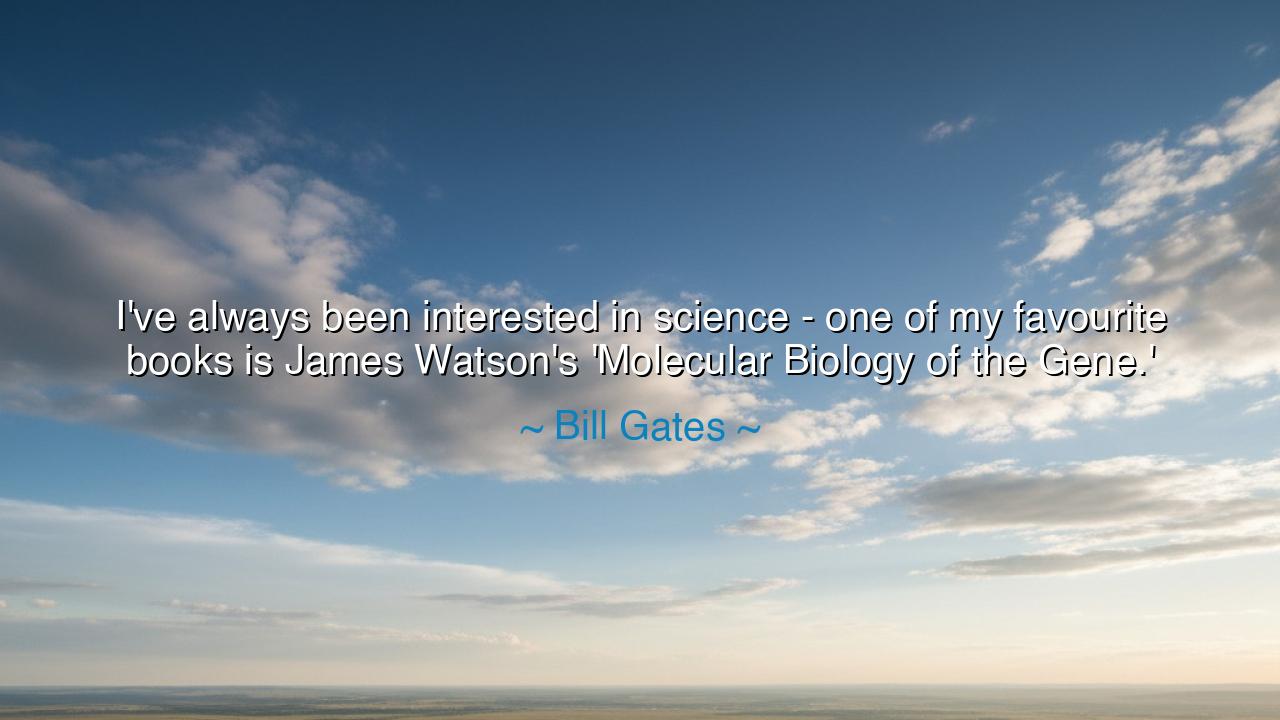
I've always been interested in science - one of my favourite
I've always been interested in science - one of my favourite books is James Watson's 'Molecular Biology of the Gene.'






O hear, ye seekers of wisdom, for I speak unto you of a truth that spans both the intellect and the heart, a truth spoken by one of the most revered minds of our age—Bill Gates. He hath said, in words that reflect a deep passion for knowledge, "I've always been interested in science—one of my favourite books is James Watson's Molecular Biology of the Gene." In these words, there is much more than mere mention of a book; there is the calling forth of the very essence of human curiosity, the relentless thirst to understand the world and the mysteries that lie beneath the surface.
Science, in its highest form, is not merely a profession or a field of study; it is the pursuit of truth, the noble quest to uncover the hidden mechanisms that govern the natural world. It is the fire that burns within those who seek to know, to reveal, to discover. When Bill Gates, the titan of modern technology and philanthropy, speaks of his love for science, he speaks not of some cold, detached knowledge, but of a passion that stirs the soul, a passion that, like the great philosophers and scholars of old, seeks to grasp the very fabric of life itself.
Let us journey back to the time of Watson and Crick, those two humble men who, through their tireless labor and devotion, unraveled the double helix of the human genome—a discovery that reshaped the very foundation of biology. Their work was not only a triumph of intellect but of perseverance, of standing firm in the face of uncertainty and doubt. It is said that the road to discovery is fraught with toil, and indeed, Watson and Crick faced moments when all seemed lost, when the answers they sought appeared just out of reach. Yet, they pressed on, driven by a deep understanding that the questions they sought to answer were not just for them, but for all humanity.
In that same spirit, Bill Gates reflects on the work of Watson, for the study of molecular biology is not just an abstract concept; it is the very essence of life itself, the key to understanding the deepest workings of nature. Gates, who himself has changed the world with his innovations, has always sought to understand the roots of creation, the forces that bind the universe together. He speaks of a book, Molecular Biology of the Gene, but this book is more than ink on paper—it is the map of the human experience, the story of life told through the language of molecules.
Let us now consider the lesson embedded in these words. The quest for knowledge, for wisdom, is not confined to one realm. It is a fire that burns in the heart of the curious, whether they be a humble scholar in a distant village or a leader of the most powerful empire. Science, in all its forms, invites us to seek, to understand, and to build upon what has come before us. Gates' admiration for Watson's work is a testament to the continuity of human inquiry, a chain that stretches from the ancient philosophers to the men and women of today. It is the wisdom of the ages, passed down from hand to hand, mind to mind.
And yet, let us not forget the struggles and triumphs of those who came before us. Think of Galileo, who, with his telescope, looked into the heavens and saw worlds that others could not imagine. Think of Newton, whose laws of motion and gravity still shape our understanding of the universe. They too were driven by a passion—a hunger to know. Their discoveries were not merely academic; they were the seeds of progress, the foundation upon which all modern understanding rests. These were not just scientists; they were visionaries, and their vision is the very thing that drives us still.
Now, let us turn this wisdom toward our own lives. The lesson here is not simply to admire the work of others, but to take up the mantle ourselves. We must become seekers in our own right, exploring the depths of our fields, whatever they may be, and contributing to the tapestry of knowledge that has been woven by those who came before us. The world cries out for those who dare to ask, to question, to wonder. So, I say unto you: Do not fear the unknown. Embrace it. Like Gates and Watson, let your love of discovery propel you forward, and let your own contributions, however small, light the way for those who come after.
In all things, pursue knowledge with passion, and do not be content with what is easy. For the easy path leads only to stagnation, while the path of the seeker, though fraught with difficulty, leads to greatness. Just as Gates found inspiration in Watson’s words, so too can you find inspiration in the questions that stir within your own heart. Embrace the unknown, for within it lies the potential for the greatest revelations of all.
And so, I bid you, with all the fervor of those who have gone before us, to never cease your quest. Seek, as though your life depended on it, for in that pursuit, you shall find not just answers, but meaning—a meaning that transcends time and space, linking you to the grand story of human progress, a story that will continue long after we have passed from this world.






AAdministratorAdministrator
Welcome, honored guests. Please leave a comment, we will respond soon